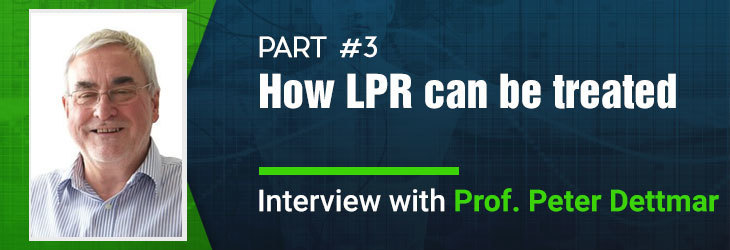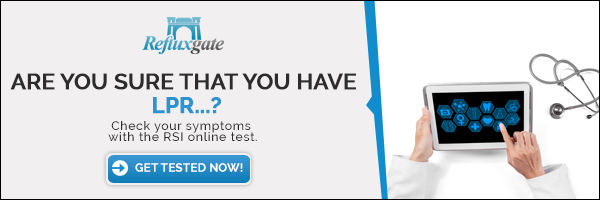It is hard for patients to find help for their LPR.
One reason is: even if you have diagnosed the disease it is very hard to treat. There is no magic pill for it. Additionally, there is a lot of misinformation about LPR treatment out there – even among health practitioners.
Find out what Professor Peter Dettmar, one of the leading researchers on LPR, has to tell about treatment.
This is the third part of the interview. The first part was about pepsin and the second one about symptoms of LPR. The fourth part is about Peptest.
Part #3 – LPR Treatment
Question: What is the role of PPI, short for proton-pump-inhibitors, as a measure against LPR?
Professor Peter Dettmar:
PPI decrease the production of acid in the stomach.
The problem is: they do not decrease the pepsin production at all.
Also: they don’t stop the reflux itself. So you will still reflux pepsin into your airways.
Pepsin is active from pH 1 to pH 7 – which means it will still be active despite of taking acid-inhibiting PPIs.
Do PPI still make sense against LPR? If yes, in which cases? How well do they work?
No, in general, PPIs are not recommended in those patients with only airway reflux or LPR. However, for those who also have the more classical reflux symptoms – heartburn and regurgitation – PPIs will be beneficial.
Can pepsin cause chronic inflammation that is not resolved after the reflux is gone?
There’s not really much information on that.
We know that the symptoms of the pepsin getting into your airways, for example, will be persistent for quite a time after you’ve stopped your reflux.
Also, even if your treat your reflux you may not have it as bad as you would have had it. But you will still have some reflux.
Before, you might have had bad reflux 30, 50, 100 times a day. With treatment, you might only be having bad reflux events five times a day. But that means that there is still pepsin coming up, which again damages those already sensitive areas.
So let’s say you completely stop reflux from one day to the other, for example, an operation. How fast do the symptoms usually resolve?
They will take quite a while to resolve.
There are surgical procedures which can be done on the voice box to repair the permanent damage that already occurred to the vocal cords.
Although these procedures will definitely reduce the amount of symptoms which you have, they won’t necessarily remove them all together.
It can be weeks post-surgery before you really feel that your symptoms are a lot better. You should immediately start to get some relief of symptoms, but it might take some time because any surgical procedure is quite traumatic to your tissues, and they all have to then get back to their previous state.
It does take time for that tissue to settle back down again.
How good is the long term success of anti-reflux operations?
The fundoplication and LINX are great options that can improve the quality of life of patients.
However, it’s often seen within two to five years of any surgical anti-reflux procedure that the symptoms do start to come back. You do get the symptoms breaking through again. In other words, the reflux is breaking through. So surgery is a good option, but it may not be a 100 percent lifetime option.
Because a fundoplication can become loose? Or how is the reflux breaking through?
Yes, the fundoplication can become loose. The LINX is still new, but there are some patients find their symptoms returning as the LINX stops working so efficiently.
Also, both the fundoplication and the LINX can’t tighten up your lower esophageal sphincter too much. Otherwise, you won’t be able to have any solid foods. You won’t be able to burp. Your life would be absolutely terrible.
So there is a tightening up of it and it does control things, but it would never be done 100 percent. Otherwise, it would make your life even worse.
Yes, you could have a new fundoplication. But that is not always recommended as it means additional trauma to an already damaged area.
It’s probably hard to put an exact number on it. But what is a rough estimation of how often symptoms come back after an operation?
A ballpark figure would be at least 50% over a two to five-year period.
We won`t be able to discuss all available treatment options in this single interview. However, except the common recommendations like operation, lifestyle & dietary modifications: are there any other treatment options which are often overlooked?
Another very important and helpful thing is vocal hygiene and speech therapy.
You should ask your ENT specialist or a speech-language therapist to get help with that.
Nearly all existing solutions concentrate on the lower esophageal sphincter. Are there any interesting solutions that focus on the upper esophageal sphincter?
No, not really.
Everyone has been concentrating on the lower esophageal sphincter because it was a lot easier to concentrate on.
People are more aware of the weaknesses also in the upper esophageal sphincter, but there’s not really anything which I know of which targets the upper esophageal sphincter. Not yet.
What about the new “Reza Band”? They advertise that it increases pressure on the upper esophageal sphincter. The device often comes up in self-help groups.
The REZA band is still undergoing clinical investigative studies. It is too early to comment on its usefulness in treating the symptoms of LPR.
How can cortisone help against damage by pepsin?
If you take the cortisol it will relieve your symptoms, but we don’t necessarily know whether that actually stops the pepsin.
So you may be fine while you’re taking that type of treatment, but the pepsin might still be present.
So when you say the pepsin is still present during cortisone treatment: does it just stall the effect of the damage? So you take it two weeks and when you stop you just feel the damage of the last two weeks in one hit?
No, the cortisol will definitely help and will allow the damaged tissue to heal up over that time. There’s no doubt about it. But it’s almost like putting a band-aid on.
You’ve covered up the injury, but when you take the band-aid off the injury is still there. In other words, the reflux can still happen and deliver more pepsin. It’s not something which is permanently going to cure the problem.
You’ve really got to treat the reflux.
Cortisol will certainly be something which you can take to give your tissues time to heal and will make life a lot easier for you while you’re taking the product. However, once you stop it, although it will have a little bit of a lag once you stop, your problems will come back again.
And the other thing is that reflux is a very chronic condition.
Once you’ve been diagnosed with reflux disease you’re going to have reflux disease potentially for the rest of your life.
So you need to find a treatment that you can do permanently for which cortisol is not a good choice.
We have talked a lot about what does not work against LPR. Except for operations, what things DO work? OK, I will sum up what we know.
First, LPR is not an acid-associated reflux disease and PPIs are largely ineffective. Many studies have reported that.
It has been shown that alginate, particularly the UK Gaviscon products, are able to bind both pepsin and bile acids and prevent them from being refluxed into the esophagus and airways.
It is important to recommend lifestyle changes and dietary changes. Also, losing body weight is important.
End of Part #3 of the Interview with Prof. Dettmar
The interview with Professor Peter Dettmar was packed with useful information. To make it easier to digest, I have split it into 4 parts.
The next and last part is about Peptest, the LPR test that got developed by Peter Dettmar and his team.
Are you searching for more information on treatment strategies? Click here to find the supreme guide on how to cure LPR.


